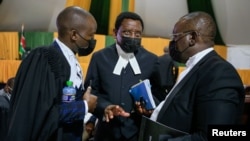Kenya’s Court of Appeal ruled Friday that a plan by President Uhuru Kenyatta and opposition leader Raila Odinga to change the Constitution was unlawful.
Justice Gatembu Kairu said the power to change the Constitution lay with the citizens, not the political elite.
“Abolishing or abrogating provisions of the Constitution in such a way to alter its foundation and structure is therefore not envisaged under Chapter 16 of the Constitution," Kairu said. "That is a preserve of people exercising sovereign power, which belongs to them in accordance with the Article 1 of the Constitution.”
Kenyatta and Odinga unveiled what they called the Building Bridges Initiative in 2018, a year after a hotly contested election almost split the country.
The proposed changes would create more political positions, greatly increase the amount of government revenue going to the county level, and allow politicians to simultaneously serve as members of parliament and as members of the government.
However, Justice Hannah Okwengu said there was no public participation in the process of changing the Constitution.
“No evidence was laid before the court to prove that there was any meaningful participation before the collection of signatures in support of the proposed constitutional amendment,” Okwengu said.
Commission had empty seats
In January, the electoral commission verified that supporters of the amendment had collected the 1.1 million signatures required to move it forward.
However, Justice Francis Tuiyott said the Independent Electoral and Boundaries Commission was not properly constituted when verifying those signatures.
The IEBC had only three commissioners — it should have seven — when it gave the green light.
“To hold that the quorum could be anything less than half membership of seven is to weaken the commission," Tuiyott said.
Odinga, in a statement posted on Twitter, said he accepted the court ruling.
"It's likely that this is not the end of the conversation and the parties involved will each make their own decision on how to proceed from the decision that has been delivered today," Odinga said.
Odinga said this week he wouldn't challenge the ruling at the Supreme Court.
Political commentator Martin Andati said Friday's ruling made it difficult for politicians to form a government for the few.
"They wanted to expand the executive so that it makes it very easy for them, but that now has collapsed … so that’s also good for the country, because for you to be able to win an election you must look for a clever way of bringing everybody on board and making sure all those interests which support you are catered for.”
Kenya is scheduled to conduct a general election in August 2022. The East African nation has witnessed a heated electoral process over the years, leading to killings and large-scale displacement of people from their homes.








